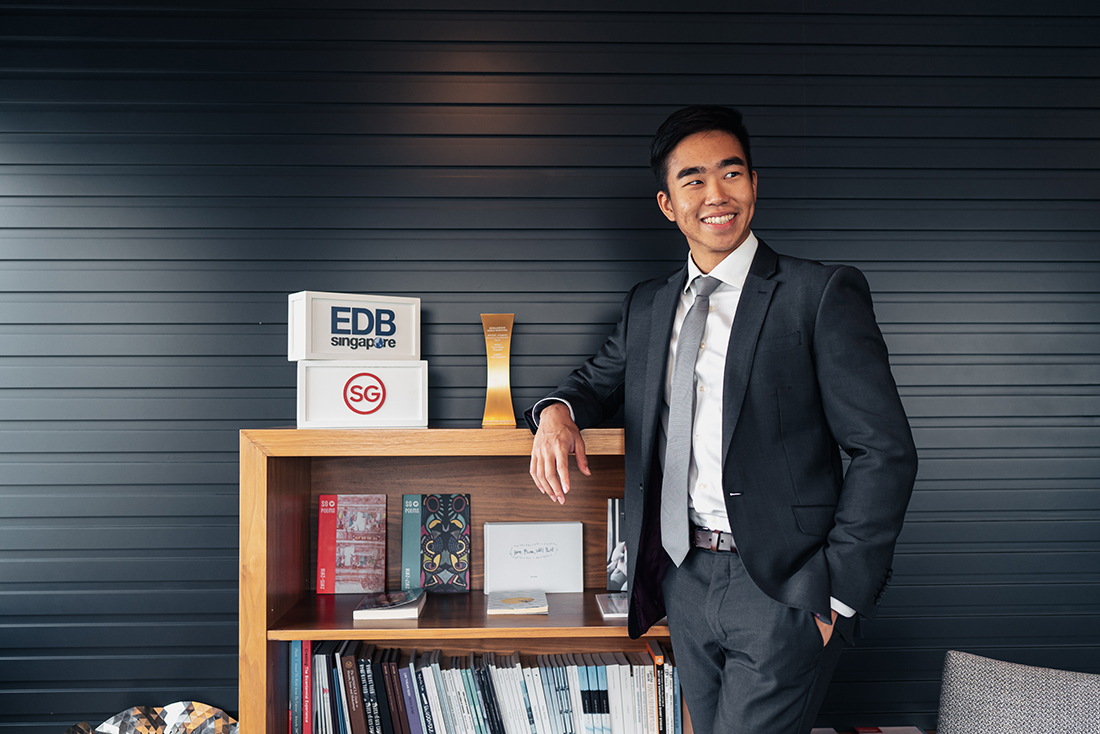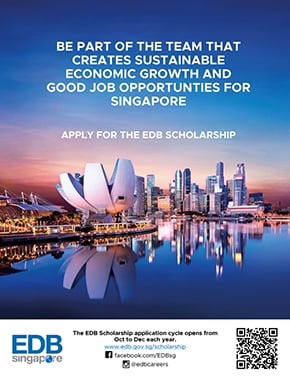Joel Teo Jin Wei engages his clients regularly to understand their business operations, growth strategies and key challenges in his role as a Senior Associate in the Technology Hardware and Equipment, Accounts Division. He is a recipient of the EDB Scholarship and holds a Bachelor of Arts (Economics) from the University of Cambridge and a Master of Science (Statistics) from the London School of Economics and Political Science.
Despite the challenging business environment due to COVID-19, EDB attracted investment commitments that are in line with our medium term goals in 2020. This is testament to Singapore being a trusted and attractive business location. Much of our sustained economic success is credited largely to the EDB which has played an important role in guiding Singapore’s economy and enhancing our position as a global centre for business, innovation, and talent. EDB’s aim is to create vibrant business and good job opportunities for Singapore and Singaporeans.
EDB’s mission resonated with Joel Teo Jin Wei, who is currently working as a Senior Associate in the Technology Hardware and Equipment Accounts Division.
BrightSparks caught up with Joel, an EDB Scholar, and learned about the motivation behind his decision to join EDB and his work at one of Singapore’s most important organisations.
What motivated you to join EDB?
I was drawn to EDB’s mission, which results in tangible outcomes that benefit Singapore, such as new factories built or new industry alliances formed, thereby creating good job opportunities for Singapore and Singaporeans. EDB’s work is globally oriented and involves close collaboration with the private sector. The prospect of partnering companies to shape and support their growth plans was attractive to me. What further differentiates EDB is that young officers are given the opportunity to meet and even engage with senior company executives from large multinationals and local enterprises. EDB also offered its officers an opportunity to be posted to one of its overseas centres, which was an attractive career pathway to me.
Tell us more about the work that you do at the Technology Hardware & Equipment Division.
We engage our clients regularly to understand their business operations, growth strategies and key challenges. With that, we support their expansion plans and develop key capabilities that are aligned with Singapore’s industry strategies. This includes working closely with our overseas-based International Operations officers who engage our client’s headquarters and building relationships with their key decision makers.
Beyond that, I am part of the team looking to build the Additive Manufacturing (AM) ecosystem in Singapore. AM is also known as 3D printing. This is done in close collaboration with key stakeholders such as the National Additive Manufacturing Innovation Cluster (NAMIC) to drive further adoption of AM in key industries. At the height of the Covid-19 pandemic in 2020, our team collaborated with local AM companies to develop and scale-up manufacturing of 3D printed nasopharyngeal swabs (NPS) to relieve the shortage of conventional COPAN (COllection and Preservation for Analysis) NPS and contribute to Singapore’s ramp up of our testing capacity.
Lastly, we are also involved in industry strategy formulation. Currently, I am part of the team in EDB that is refreshing the Precision Engineering’s (PE) Industry Transformation Map (ITM), a roadmap that lays out our vision and aspirations for the PE industry of the future. I am also involved in various pieces, such as reviewing the performance of the first PE ITM, researching into PE’s enterprise landscape, and forecasting key macroeconomic indicators for the next five to 10 years. This allowed me to apply the data analytic skillsets picked up in school to support industry strategy formulation.

Joel Teo Jin Wei
What is the work culture at EDB?
Being at the forefront of industry development, EDB is naturally a fast-paced and dynamic organisation. Officers are required to stay abreast of the latest developments and trends to identify growth opportunities for Singapore. EDB officers are also driven and ambitious to chase after these opportunities.
At the same time, EDB officers are highly collaborative and willing to go out of their way to help fellow colleagues. We are united by our common mission to create sustainable economic growth and good job opportunities for Singapore and Singaporeans.
What opportunities are there for scholars at EDB?
EDB scholars are given strong support even before starting work. This includes a summer internship with EDB in Singapore and subsequently, a potential stint at one of EDB’s overseas offices. I had the opportunity to intern at EDB’s San Francisco office where my team met with top semiconductor firms located around the Bay Area to understand their growth strategies better. Early exposure to EDB’s work helped me appreciate its multi-faceted and yet complex nature and assisted me greatly when I returned to work in the organisation full-time.
Finally, what would you say to somebody who is considering an EDB scholarship?
If you are looking for a challenging career with a meaningful social purpose and are excited by the prospect of playing a part to shape the economy of Singapore, consider the EDB scholarship. You would be given many development opportunities based on your interests and aptitudes, and would be able to grow in a dynamic yet collaborative and safe environment.


